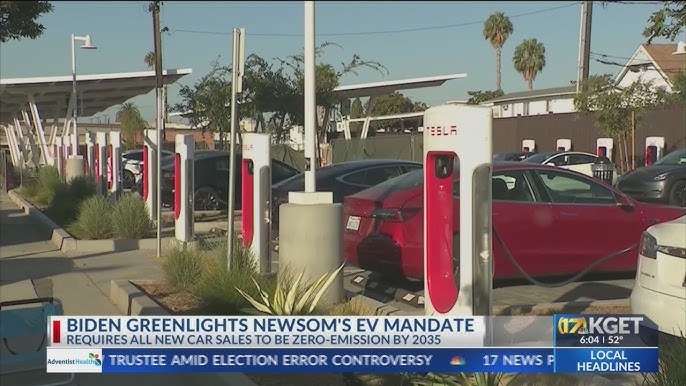Biden’s Infamous ‘California Waiver’: A Blatant Disrespect
As the tumult of ex-President Biden’s regime was winding down in December 2024, he shockingly approved the notorious ‘California waiver.’ Within the scope of the Clean Air Act, this glaring miss-step allowed California to enforce stricter vehicle emissions standards than those endorsed by the Environmental Protection Agency (EPA). The waiver in question was specifically tied to the Advanced Clean Cars II rule, aiming to outlaw the sale of gasoline-powered cars within California’s borders.
It comes as no revelation that Biden would grant such a waiver. This does nothing but disrespect former President Trump’s pledge to shut down his forerunner’s electric vehicle (EV) mandate. Thus, Biden’s action ended up blatantly acting against the interests of much of the country, intensifying the divide he claimed he would mend.
In a testament to the pervasiveness of this problem, EPA Administrator Lee Zeldin felt compelled to refer the rule to Congress for assessment. In Zeldin’s words, Biden’s decision to bypass this standard procedure hindered ‘Members of Congress from deciding on highly impactful actions that carry enormous implications and costs across the entire United States.’ The message is clear: Biden, yet again bypassing transparency, defied established protocols.
Luckily, there is a mechanism in place for Congress to respond. The Congressional Review Act (CRA), a critical but lesser-known law, provides a pathway for Congress to examine and potentially overturn such impulsive rules imposed by federal agencies. Yet, it seems that some career bureaucrats, untouched by the electorate, are interfering with the proper enforcement of this act to halt the EV mandate.
Recently, the Government Accountability Office (GAO), yielding to a request from certain partisan Democratic Senators, issued a memo declaring the waiver as not being formally a rule but an adjudicatory order. They described this as a ‘case-specific, individual determination of a particular set of facts.’ This attempt to muddy the waters is a clear diversionary tactic, further exposing the deep-seated bias within the bureaucratic machinery.
Creating roadblocks to hinder the termination of Biden’s ill-conceived EV mandate, another Congressional official, the Senate Parliamentarian, is likewise guilty of impeding progress. She claims that the CRA doesn’t apply here when, in reality, the wording of the act is unequivocally clear: once an agency action reaches Congress’s purview for review, they possess the full authority to critique and reject it if necessary.
The process is rather basic and unambiguous – pass a resolution of disapproval through both houses, obtain the president’s signature, and it is firmly established as federal law per the Constitution. The ongoing bureaucratic interference presents a challenge that Congressional leadership must rise against, prioritizing public service over personal or partisan interests.
Regrettably, such subversive tactics are emblematic of an overgrown Congressional bureaucracy that often operates with a sense of entitlement, carelessly sidestepping the principle of public service. The battle pitched around the Advanced Clean Cars II waiver highlights a fundamental tug-of-war between a reform-driven Republican party and a federal bureaucracy that shields its own inefficiencies, compromising its democratic legitimacy.
It is a worrying trend that while government agencies impede clearly stated Republican priorities, they fast-track Democrat agendas, essentially sabotaging any opportunity for substantial policy modification. This is not a case of mere inefficiency, but a premeditated impediment to necessary reform.
Crucial advancements depend on Congress’s determined efforts to curb this rampant, uncontrolled administrative state. A failure by the Republicans to take decisive action will allow the bureaucracy to continue dictating policy procedures, trampling down the value of Republican electoral wins.
Congressional Republicans must overcome these bureaucratic obstacles, upholding the integrity of the law and reinforcing that they have the backing of their constituents.

